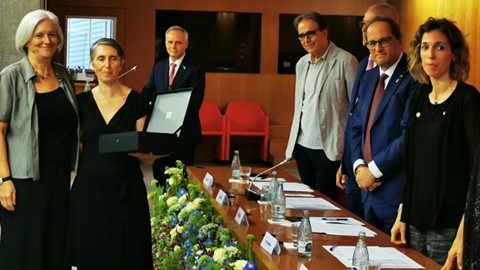In September 2019, the Minor in Gender Studies at the UAB received the Mention Encarna Sanahuja Yll in its first call. This is a recognition that the Government of the Generalitat de Catalunya extends to initiatives that promote gender in the context of higher education.
The multi-annual project for the distribution of resources awarded with the Mention Encarna Sanahuja Yll to the Minor of Gender (UAB) covers the period between March 2020 and March 2023. It is a period of three years , each of which is aimed at a relevant area for gender teaching or “gender sensitive”: the creation and consolidation of networks (2020), methodological innovation (2021) and thematic challenges (2022). The consideration of these three areas offers a global image of the current state of gender teaching in higher education institutions that can form a kind of diagnosis in relation to what needs to be reviewed, improved, transformed, that is, offers the possibility of influencing in a critical and effective way the promotion of a teaching of gender of excellence at the same time as to the height of the needs as well as of the real expectations of all the university community.
At the same time, the relationship established between the three areas makes it possible to place gender at the center of reflection on teaching in a gesture that is both intra-academic and inter-academic. Intra-academic, in order to favor the evaluation of forms, techniques and resources more suitable for “gender sensitive” teaching in the classroom and through a common, and extra-academic, because it incorporates the challenges that debate and gender activism brings to the classroom, and because it seeks a look beyond its walls and establishes real and virtual links in dialogue with other institutions and entities in terms of gender.
The programming of activities for each of these three areas aims to promote the involvement and participation of the entire university community. This means that the aim is to develop a program with which both teachers and students can engage and which is also interesting for other teaching communities, university or not, national and international. In this way, a social transformation is sought that is also institutional and that is promoted collectively.
The first year of programming focuses on the creation and consolidation of gender networks. This is the first step towards the creation and consolidation of gender networks within the institution, of an interfaculty nature, and outside the institution, so that the “gender sensitive” teaching programming can concretize the challenge of internationalization beyond of the context that seems to be its own, research, acquiring a character not only international but above all internationalizing.
This is the main goal of programming dedicated to gender networks. It is about taking an active role in the transmission of knowledge and in the transfer of gender knowledge within and outside the university community itself.
